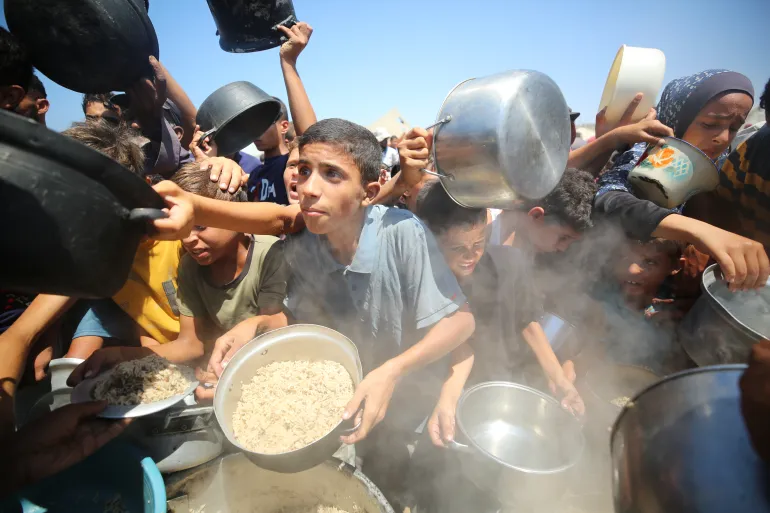Following the recent resurgence of polio in Gaza, the UN issued an urgent appeal last week for a seven-day “humanitarian pause” in the ongoing conflict.
This temporary ceasefire is crucial to facilitate the safe movement of both aid and humanitarian workers within the enclave.
As preparations begin for a comprehensive polio vaccination campaign, Hassan el-Tayyab, Legislative Director for Middle East policy at the Friends Committee on National Legislation, emphasized a pressing concern, that the failure to deliver essential supplies could exacerbate the already dire health crisis.
“A 10-month-old baby in Gaza is now paralysed in one leg: This is the first polio case in Gaza in 25 years. This is a massive threat,” el-Tayyab stated.
“At the same time, malnutrition is running rampant. Patients that are suffering from malnutrition have a lot lower effectiveness when taking this vaccine, so obviously we need the food to make sure that the vaccines actually even work.”
Hassan el-Tayyab
To stop the spread of the disease, aid agencies must reach 90% of the estimated 640,000 children under the age of 10 in Gaza.
That is already challenging as Palestinians have been subjected to an increasing number of evacuation orders by the Israeli military, crowding them into ever tighter, more remote spaces.
More than 25,000 vials of vaccine, enough for over a million doses, have arrived in Gaza along with the equipment needed to keep them cool while they are being transported.
However, health experts have warned that it would be virtually impossible to carry out the vaccination drive successfully under bombardment.
Meanwhile, Israel’s Prime Minister, Benjamin Netanyahu suggested that there could be partial suspension of military operations in Gaza to allow young children to be vaccinated against polio.
In a statement, Netanyahu’s office denied an Israeli television report that there would be a general truce during the vaccination campaign which begins on the weekend, but said it had approved the “designation of specific places” in Gaza.
“This has been presented to the security cabinet and has received the support of the relevant professionals,” the statement said.
One possibility suggested by Netanyahu’s statement is that Israeli bombardment would be stopped in different areas of Gaza sequentially, to allow the aid workers with the vaccines to move from one to the other.
Juliette Touma, Spokesperson for the UN relief agency, UNRWA, said that the uncertainty over humanitarian pauses and evacuation orders makes planning extremely difficult.
“Plans are the bread and butter of any successful humanitarian operation. You have got to know how many people you are going to reach: where are they located? How are you going to reach them?” Touma said.
“Planning is such an important element of the success of any operation, but in Gaza planning is almost nonexistent.”
Juliette Touma
UN Security Council Set To Meet On Gaza
The UNSC will meet in New York later today, Thursday, August 29, 2024, at the request of the United Kingdom and Switzerland, to discuss the humanitarian situation in the Gaza Strip.
The move comes after Israeli forces on Wednesday, August 28, 2024, opened fire on a “clearly marked UN humanitarian convoy” with the World Food Programme in the war-torn enclave.
As a result, The World Food Programme (WFP) said it was pausing movements of its employees within Gaza.
On Monday, August 26, 2024, a UN official said that the organisation was forced to pause almost all aid operations in Gaza after Israel issued another raft of wide-ranging evacuation orders.
According to advocates, the US has a duty to speak up, particularly as childhood malnutrition surges in Gaza and cases of polio spread.
“The United States government has run out of words and hasn’t even issued its usual performative statements to comment on the UN suspension of its aid operations in Gaza,” said Raed Jarrar, the Advocacy Director at Democracy for the Arab World Now (DAWN), a human rights nonprofit based in Washington, DC.
Advocates like el-Tayyab believe the administration of US President Joe Biden can be a critical force in making a pause a reality.
“Diplomatic pressure is absolutely huge,” el-Tayyab said. “Biden should use the bully pulpit to call for the seven-day polio pause right now.”
READ ALSO: Highlife Awards Categories Urged to Be Created to Inspire the Younger Generation



















